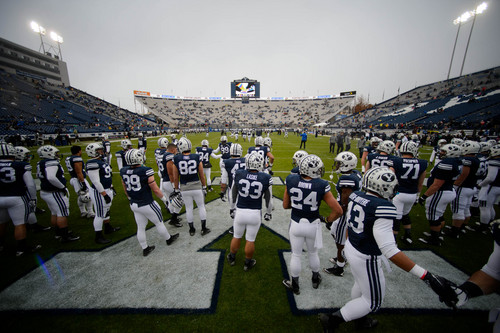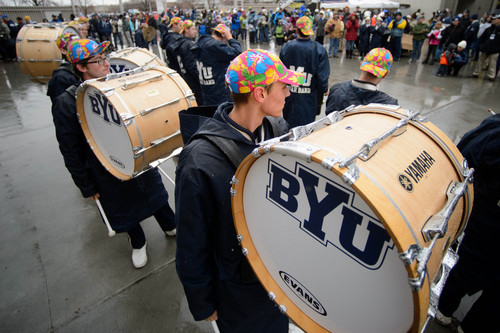This is an archived article that was published on sltrib.com in 2014, and information in the article may be outdated. It is provided only for personal research purposes and may not be reprinted.
BYU football has seen better times.
On the porch of the 30th anniversary of the program's national championship season, back when a thousand miles of open road and a limitless future seemed in front of Cougar football, something has gone horribly wrong. A lot of things have gone horribly wrong, particularly of late, all of which make that old achievement a distant, clouded memory, and, even worse, maybe a symbol of lost hope, of things done that never will be done again.
Yeah, it's that bad.
Where have you gone, Robbie Bosco?
The days of May in Provo have turned into three weeks of Maydays. The Cougars are in serious distress. Borders are closing in, fences are being built around them — not to keep others out, rather to keep BYU in. Its football legacy is being tarnished. Its worth as a modern football entity is being lessened. Power conferences don't see the Cougars as a worthy opponent. And, on top of that, on Wednesday, word arrived that BYU is investigating its own program on allegations of improper benefits doled out to some players by its former director of football operations.
One source familiar with the situation told The Salt Lake Tribune that benefits were, in fact, offered and were, in fact, taken.
Cougar football is absorbing shots — from without and within.
The question is: Will anybody provide help?
A bigger question: What does being wounded and weary mean for BYU in the years ahead?
Bronco Mendenhall, as is his way, would whisper in biblical tones, likening his outfit's current ordeal to the parable of the Good Samaritan, and Cougar football is the unfortunate traveler robbed and left for dead along the path. Who will nurse and clean up the program's injuries and take it to the inn to heal? Who?
Not the SEC. Not the ACC.
Those leagues recently took a banana knife to BYU's reputation, carving it down a couple notches, saying that its members can schedule BYU, but if they do, they will not receive the same credit they would in playing teams from their own leagues or the Big Ten or the Pac-12 or the Big 12. New stipulations put in place by those conferences mandate that teams play at least one nonconference opponent from one of the top five leagues.
They condescendingly patted BYU on the head and sliced off its lower extremities, content to watch it bleed out. In the playoff era, where perception is still important in matters of strength of schedule, that action firms up the idea that playing BYU could weaken schedule strength.
The Cougars don't play SEC and ACC teams all that often, but the symbolism of their being relegated to a lower status reinforces an unfair stereotype that independent BYU is unclean and unworthy, unequal to even lesser members of the power conferences, teams the Cougars have outperformed over the past three decades.
Not only does BYU not share the same access to big bowl games that teams from the power conferences do, now it is being devalued as a means for those teams to accomplish their goals, as though it were some kind of UNLV or Southwest Presbyterian. Even the Mountain West Conference is reconsidering its scheduling philosophy regarding BYU — enjoying every aspect of that disingenuous reconsideration — and the competitive benefits of playing the Cougars.
The indignity of such nonsense is tough for BYU to bear.
Exactly where these happenings leave the Cougars is not yet fully known. But they have been undercut, they have been damaged, they currently are not perceived to be a completely relevant player. They are not eating at the big-boy table.
Although, the fact that they do perhaps break NCAA rules, and are forced to dig through their own dirt, just like a lot of the teams in the power conferences, might bring them some street cred. Maybe they do fit, all snug, into, say, the Big 12, after all.
BYU football is at a crossroads, then. Independence is not sustainable and the Cougars have to change that status — if they want to have a national program with a national impact. They can go large by finding a way into one of the big leagues, or they can settle for being a nice little outfit that plays pure lesser-level ball.
They can't do both.
If they aspire to the former, most importantly, they have to win. They have to make themselves un-ignorable. They can't change their geography. They can't change their school's orientation, nor should they. They can tamp down their arrogance.
BYU has tried to connect with the Big 12, has looked for solutions to the complexities that separate them. That ground presently is difficult to plow. But short of that, or something like that, Cougar football will become —-and remain - a program far less significant than its fans once dreamed of it being, all those Heismans and Outlands and Davey O'Briens and Doak Walkers ago. ESPN could at some point lose interest in signing contracts and televising games that don't carry any national heft.
The whole deal about BYU football being a missionary tool for the LDS Church doesn't work nearly as well when a dwindling number of interested Cougar fans are the only ones watching. And for church leaders, who make up the school's Board of Trustees, reading news reports about NCAA rules violations, having to explain why a football staff member is running rogue, might not fit their concept of why sponsoring football at a religious institution is a great idea.
People are just people, though, even at BYU.
Some 30 years ago, when LaVell Edwards raised the national championship trophy skyward, he probably saw a different future for Cougar football. He saw a thousand miles of open road. Now, somewhere out there is a bruised, beat-up traveler and a distress call: Mayday! Mayday! Mayday!
Who can help?
GORDON MONSON hosts "The Big Show" with Spence Checketts weekdays from 3-7 p.m. on 97.5 FM/1280 and 960 AM The Zone. Twitter: @GordonMonson.





